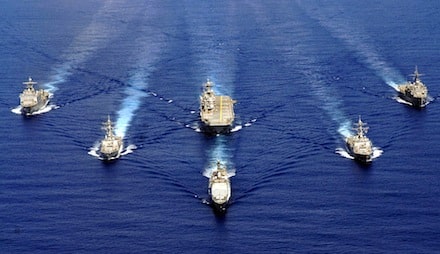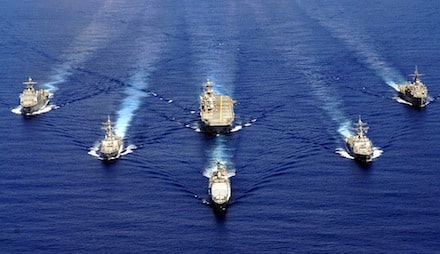Much has been written about the dangers and challenges posed by China as a rising global power. Indeed, historians speak of generic tensions between rising powers and status quo powers that have often led to war.
But instability takes at least two players to create it: the rising power and the resistance of the once-reigning power. Today the US is that once-reigning power, now in a state of relative international decline. If the US itself, and the international order including rising powers, do not acknowledge and handle this transition wisely a dangerous confrontation awaits.
The reasons for US decline across the boards are well known and well described in many statistics. They are not, however, regularly acknowledged by large segments of the US population including Washington. Here I would like to look primarily at the foreign policy aspects of this decline and its implications.
The decline of US power abroad cannot be separated from many domestic failings: deadlocked governance, bloated military budgets and their huge opportunity costs, the rise of the military-industrial-security state and its massive cash infusions into Congress; an impoverished political spectrum that begins on the moderate right of center (Obama) and caroms on over into various degrees of crazy right. There is virtually no left of center—indeed the very word “left” borders on the obscene in the American political lexicon. And we have the intellectual isolation and distortion inherent in America’s vision of the rest of the world. A “mainstream” corporate-dominated media that shields the population from distasteful global realities. The belief that America itself represents “reality.” The security-state mentality that promotes paranoia and fear. The belief that the American imperium is ageless, on an eternal mission without bounds, fundamentally benign, and a universal good.
The American decline is of course relative. It reflects the rise of new powers—China, India, Brazil and others—who, along with Russia, are able to reshape the global economic order in ways that have dislodged a longtime US monopoly. Washington’s inability to acknowledge the full implications of this change is vividly evident in its spectacular error in seeking to torpedo the Chinese/Russian-sponsored new Asian development bank (AIIB)—even as most of the rest of the world seeks a participating role.
US military power is of course unchallenged anywhere in conventional warfare and will be so for a long time—due to our massive financial outlays that surpass that of the next ten world powers combined. Problem is, the wars that matter—Iraq, Afghanistan, Yemen, Somalia, even the Islamic State—are not conventional and the US is losing them all. Diplomatically it has isolated itself and is thus ignored, if not viewed with contempt, by much of the world, and certainly in the Muslim world where a rolling, diffuse insurgency is perhaps still gaining strength, in part fed by past US policy errors. Most states are on a quest for greater sovereignty and in many respects go their own way now without regard for US demands.
Most Republicans and hawkish Democrats don’t even get the picture: they attribute the inability of the US to overcome these challenges to mere presidential weakness. If the military force we employ now is not working, simply use more force and we’ll get back to the good old days of the unchallenged American imperium. “Continued US global supremacy” remains the unswerving motto. But how much global appeal does that mantra contain? In a 2014 international WIN/Gallup Poll of 64 countries the US was perceived hands down as the single greatest threat to world peace.
But the real danger comes precisely in our inability to see, much less accept, these changes on the global scene: shifting economic power, assertiveness of new rising states, the impossibility of crushing Muslim nationalism that constantly reinvents itself, the return of a multipolar world, and nationalist aspirations that wants no Big Brother.
America has been long used to calling the shots around the world, acting as a global policeman of sorts, protecting the American imperium that we narrowly perceive as an absolute global good. Those days are gone and attempting to perpetuate it brings great peril—including national financial ruin.
Today specifically it is astonishing to witness how Washington still feels entitled to boldly carry on its geopolitical struggle right up to the very doorstep of the “enemy.” American warships in the “Russian lake” of the Black Sea maneuvering right up to the borders of Russian waters is amazingly provocative in nature. Same for US military presence just off Chinese waters. Can the US really expect today to militarily dominate the China Sea? Surely this is a question of regional state relationships in which we can play, but not conduct a global mission of “checking China.”
It can be productive to look at things from the perspective of the other player: how would Washington feel if Russian or Chinese warships were routinely cruising just outside US territorial waters and testing our electronic defenses, and building bases in Mexico, Cuba or Venezuela? Washington would bellow in anger over such aggressive action. Is it not possible that Russia or China might both have their own Monroe Doctrines?
Russia and China, among other powers, are undergoing a historic reordering of their spheres of influence that indeed impacts other regional states. Their actions are hardly altruistic—although we seem to have convinced ourselves that our own ambitions are. But provocative US acts at the borders of others creates a map where every situation becomes a dangerous zero-sum game.
In essence, this is transition away from a “unipolar moment”—after the fall of the Soviet Union when we became the world’s sole superpower—into an increasingly multipolar world. Yet many in Washington don’t seem to have grasped this shift, although President Obama, to his credit, seems partially to have done so.
We are thus entering a very dangerous period. America thinks it still has the right to act as sole global superpower, flying in the face of realities in playing chicken on the doorsteps of Russia and China—and worrying even our allies who do not support such actions.
Indeed there are many small powers who live on the doorstep of these world powers—the Ukraines, the Baltic states, the Georgias, the Vietnams and Taiwans—who are understandably uncomfortable with their proximity to a neighboring great power. They permanently seek to entice us into offering full protection. We shouldn’t be suckers for that military game even as we maintain a strong non-military presence as a major world power.
Can we manage this transition to a multipolar world ourselves, or are we going to try to keep on playing sole superpower—where any issue anywhere can be declared a “vital national interest.” And how much will the rest of the world tolerate that old paradigm from us, before they decide it is unwelcome and act accordingly?
That’s the danger that stems from an declining power. A new balance in world power and responsibilities is in the offing, but will the transition be safe? Do we have the imagination?
Graham E. Fuller is a former senior CIA official, author of numerous books on the Muslim World; his latest book is “Breaking Faith: A novel of espionage and an American’s crisis of conscience in Pakistan.” (Amazon, Kindle) grahamefuller.com.
Reprinted with permission from author’s website.


